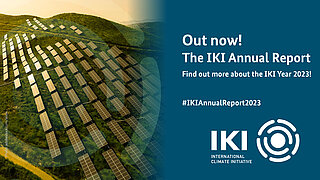Copyright: Oleksandr Popenko
German Federal Minister for Economic Affairs and Climate Action Robert Habeck announced the start of the IKI pilot project ‘Renewables for Resilient Ukraine (R2U)’ during a visit to Ukraine.
Destroyed residential buildings are one of the most visible consequences of the Russian war of aggression against Ukraine. In early April, German Economy Minister Robert Habeck visited the town of Horenka, 30 km northwest of the capital city of Kiev, to gain a personal impression of the war damage and level of rebuilding required – and the potential for renewables in the aid and reconstruction phase.
Successful demonstration project for the use of renewables
Habeck’s visit was in response to an invitation extended to the minister from Ukrainian climate and environmental NGOs to attend a presentation of a demo project on the use of renewable energy in Horenka. The NGOs have joined forces to work on the reconstruction of the destroyed heating system in the local hospital. Renewable energy technology has been used here, with the technical solution featuring a rooftop solar system, storage and a geothermal heat pump. As a result, the hospital can meet 70% of its energy requirements independently of the national grid.
This real-world example highlights the benefits of decentralised renewable energy for rebuilding work in Ukraine – from rapid emergency aid to strengthening ‘helping people to help themselves’ approaches and the reliability of the energy supply, as well as contributing to climate change mitigation.
Support from the International Climate Initiative (IKI)
The dedication shown by the NGOs – successfully implementing the demonstration project in the midst of a war zone – clearly impressed the German minister:
"I would like to express my sincere appreciation for what civil society actors and local community members have done here at Horenka Hospital by installing decentralised renewable energy solutions to restore energy and heat supply."
Habeck assured his Ukrainian colleagues of Germany’s support for the implementation of large-scale renewable energy systems for emergency aid and reconstruction in Ukraine.
The IKI also has a role to play here, with Habeck announcing that the Federal Government would be launching the IKI pilot project ‘Renewables for Resilient Ukraine (R2U)’ in April 2023 and thereby contributing to the German-Ukrainian energy partnership’s ‘Renewable Energy’ working group.
Awarded a funding volume of EUR 2 millions and with the German Gesellschaft für Internationale Zusammenarbeit (GIZ) as the implementing organisation, the project will take the initiative of the Ukrainian NGOs as its starting-point and help them to scale up the insights gained in their demonstration project. Similar demonstration projects will be set up in up to eight other towns with the participation of the local councils.
Analysis and modelling – opportunities for networked renewable energy systems
Building further on this pilot project, the German Energy Agency (dena) will be working closely with the IKI to analyse and model options for networked renewable energy systems in specific districts within these communities.
The insights gained from the demo projects and dena analyses will be consolidated onto learning and dialogue platforms to be used by stakeholders from civil society, government, business and international donor groups, so as to promote the expansion of extensive programmes to promote decentralised renewable power.
Background: Ukraine as an IKI priority country
Ukraine is a priority country for the International Climate Initiative. The IKI has supported Ukraine since 2008 and will continue to expand its engagement here in the future. To date, the funding programme has supported 20 bilateral projects between Germany and Ukraine, with a total funding volume of almost EUR 100 million. This cooperation has focused on climate change mitigation, meaning that the IKI supports further development and ambition raising for the Nationally Determined Contribution (NDC) and corresponding sector strategies. Energy efficiency in the building sector is the top priority here. Conservation and biodiversity are also addressed in the Ukrainian IKI portfolio but to a lesser extent.
The new ‘Renewables for a Resilient Ukraine (R2U)’ pilot project will contribute to the German-Ukrainian energy partnership’s Renewable Energy working group and follows on from the ‘Supporting structural change in Ukrainian coal regions’ project from the German Federal Ministry for Economic Affairs and Climate Action (BMWK), also implemented by GIZ.



